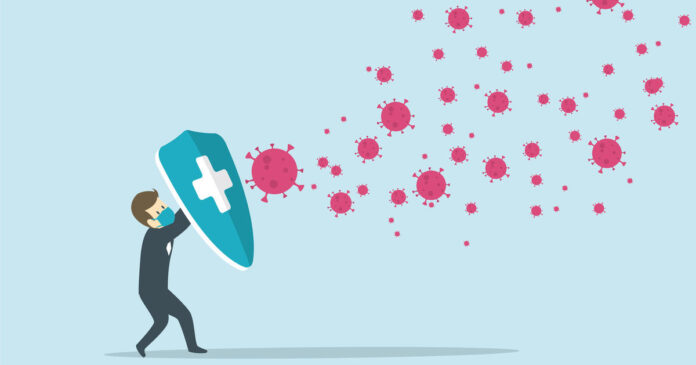Seasonal Coronavirus re-infection usually happens between 6 and 12 months from the date of the previous infection, which indicates that the protective immunity against these viruses – including the Covid-19 may be short-lived.
But a recent study revealed that the Covid-19 infection can give humans long-term immune cells to immunize them against infection again.
The study – conducted by scientists from the Department of Pathology and Immunology at the University of Washington School of Medicine, and published by Nature last Monday – focused on monitoring the short-term and long-term antibodies produced by the immune system in response to the viral attack of Coronavirus.
Usually, the human immune system produces antibodies in response to a viral or bacterial attack or any other pathogen, which are proteins that destroy pathogens that invade the body by binding to them to become harmless, or distinguishing them so that they are easy to eliminate, and the antibodies remain in the bloodstream after the infection in anticipation of the virus returning, and upon its return, the antibodies are ready to attack it and reduce the chances of infection again.
For his part, the Egyptian researcher Ali al-Labidi, the leader of the research team at the University of Washington’s College of Medicine, explains that infection with the Coronavirus results in the assignment of a specialized immune cell called a “plasma cell” to secrete antibodies that help to remove the Pathogen.
“The production of some of these plasma cells is rapid, to secrete an early wave of protective antibodies, and these plasma cells are short-lived, and when they begin to die, the levels of antibodies in the blood begin to decrease,” Al-Labidi added.
Regarding long-term cells, Al-Labidi says: The infection results in the production of another group of more mature plasma cells called long-lived plasma cells (BMPCs) after infection, and these cells mostly live in the bone marrow and are responsible for secreting antibodies for long periods.
This maintains our protective status against the virus, so when we are exposed again to pathogens, we are in better condition because of those preformed antibodies.
He pointed out that the results of the research paper came after tracking a group of people in the process of convalescence after a mild infection with the Coronavirus for up to 11 months after the first symptoms appeared.
The results showed that the short-lived antibodies in the blood directed against the main surface protein of the Coronavirus, which is the “Spike protein” – which is a major target for antiviral immune bodies – rapidly diminished in the first 3-4 months after Infection, but these levels become more stable 7 months after infection.
Researchers examined the blood samples of 77 volunteers approximately a month after their symptoms appeared (49% were females, 51% were males) with a mean age of 49 years, and most of them had mild illness; Only 7.8% of them had to be hospitalized.
The research sample was followed up by examining their blood samples three times over a period of about 3 months.
The research team conducted studies to find the reason for the stability of antibody levels to the virus again after they faded, by taking direct samples from the bone marrow of a subset of these patients, during the period from 7 months to 11 months after infection.
Al-Labidi says: The results showed that these people had long-lived plasma cells that secrete antibodies specific to the Coronavirus protein, and this is likely to be the reason for the stability of antibody levels in the blood in the following months, and this study is prepared The first of its kind to directly demonstrate the role that long-lived plasma cells in the bone marrow play in enhancing immunity after Coronavirus infection.
On their future steps, Al-Labidi says: We are now investigating whether these long-term plasma cells have also been stimulated in humans after vaccination with the Coronavirus vaccines.
On February 11, 2020, the International Committee for Classification of Viruses at the World Health Organization announced the name “SARS-Cov-2” that causes severe acute respiratory syndrome (SARS) as an official name for the emerging Coronavirus.
Severe acute respiratory syndrome (SARS) in 2003, but the two viruses are different despite their genetic link, and in turn, it announced that “Covid-19” is the official name for this new disease.

